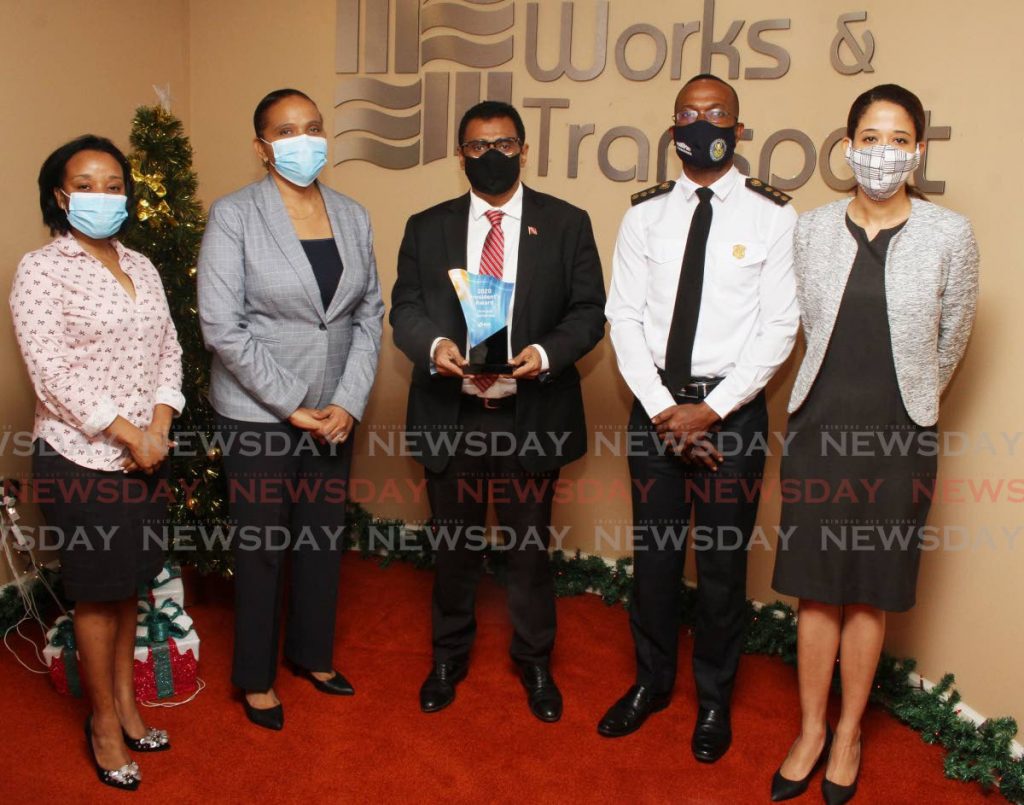Ministry of Transport's U-Turn wins IDB award for innovation

WORKS minister Rohan Sinanan says many lives have been spared with the U-Turn System, implemented this year, which won his ministry the Inter-American Development Bank (IDB) President's Award for innovation in the public sector.
The ministry won the 2019/2020 award with its entry, the software management system to support the implementation of the Demerit Points System, a new fixed-penalty or traffic ticketing system and a red-light and spot-speed camera enforcement system.
Sinanan, while he was proud, said credit belonged to Transport Commissioner Clive Clarke, who spearheaded it, along with former director of legal services at the works ministry and new Minister of Public Utilities Marvin Gonzales, and Kizzie Ruiz, head of the ministry's communications department.
"Sitting as minister, I was fortunate to have a staff who could have produced something like that. I am fortunate to say (it was done) under my tenure but it was really the work of the technical staff at the ministry," said Sinanan in an interview at the ministry's head office.
Much was accomplished, he said, with the ministry mainly utilising in-house expertise, apart from things like the development of software.
The ministry's Permanent Secretary Sonja Francis-Yearwood told Newsday, "I think, for this project, we were able to look at interconnectivity within the ministry. Often times in a ministry, you hear about operating in silos. Not for this project. All the different projects played a part.
They said the larger U-Turn project took considerable engagement between several public bodies and state institutions, including the police, the Traffic Enforcement Centre, the TT Postal Service and the judiciary.
And while some foreign concepts may have been adopted, Sinanan said "we have a different culture here and everything we do, we have to tailor it to our culture."
Sinanan said Clarke would have been integral when he was head of IT at the works ministry, before actually spearheading it. Also deserving of much credit, Sinanan said, were former director of legal services at the works ministry Gonzales and Ruiz, whom he said sold the concept to the country.
"I mean it was a really innovative way to transform motor vehicle laws in TT ... a leap into the future. And so far we have already been seeing the benefits," Sinanan said.
So far, the police reported at least 59 permit disqualifications and over 5,000 varying sanctions.
The works ministry said it "leveraged the use of technology to develop a custom software management solution to (work) against the backdrop of 1,135 fatal road traffic accidents between 2009 and 2015, over 150,000 unpaid traffic tickets, an overburdened judicial system, antiquated laws and dated operating procedures."
Meanwhile, Clarke said, one of the key things coming out of the supporting legislation is the emphasis on rehabilitation.
"It is not about income. There is a provision in the legislation that allows for, when the permit is disqualified, you have to go through a remedial session. We are concerned about changing behaviours.
He reminded the public that people could visit the relevant website online to view their infractions.
"Therefore, they know they have to change their behaviour. I don't have to commit an offence to give the State more revenue. You can control that as the driver.
Sinanan added that the State would prefer drivers follow traffic laws than benefit from the proceeds of fixed penalties.
The software management system supports the implementation of the Demerit Points System.
The ministry says it can, "Monitor, track and rehabilitate errant drivers; Replace outdated business processes with modern solutions (online transactions, new payment options, and the use of mobile hand-held ticketing devices; provide seamless connectivity and real-time information sharing across various agencies; assist with streamline the operations of the judicial system; assist in the fight against crime and criminality; Reduce corruption and corrupt practices; and support the introduction of a Traffic Enforcement Centre."
The ministry said it had documented evidence of positive change on the behaviours of errant drivers, reduction in crime and criminality and the operation of the Judiciary, all owing to the new system.
"For example, since its implementation, official TTPS data shows that there has been a 22 per cent decrease in fatal road traffic accidents and a 29 per cent decrease in road traffic deaths compared to last year.
"The use of hand-held mobile devices have allowed law enforcement to detect criminal activity such as stolen vehicles as well as identify several fraudulent permits in circulations on routine traffic stops."
The Judiciary, it added, has also recorded a 97 per cent reduction in traffic cases entering the Judicial System which "seeks to unclog the previously burdened system."
The ministry described the U-Turn Software Management system as an "extensive enterprise application that utilises technology to create vast improvements to existing work flows for processing traffic violations in the following ways:
"Centralised Data – A holistic approach was taken to information whereby all stakeholders share access to a centralised repository of data, drastically reducing wait times through requests across institutions and improving the accuracy of data used. This improved communication between the four key agencies.
"E-Ticket – One of the major improvements in traffic ticketing system is the use of mobile hand-held devices by law enforcement officer to issue tickets. It allowed for the migration from a paper-based ticketing system to the use of electronic ticketing devices; significant reduction in the time taken (from 25 minutes-2 minutes) to issue and record the details of traffic violations; improved accuracy of information recorded by law enforcement officers; convenient options for the payment of traffic tickets with the introduction of new payment locations."
The IDB's President's Award Competition began in 2018 under the patronage of President Paula-Mae Weekes. The company's website says the awards are meant "to recognise transformational initiatives undertaken by public sector institutions across the country."

Comments
"Ministry of Transport’s U-Turn wins IDB award for innovation"